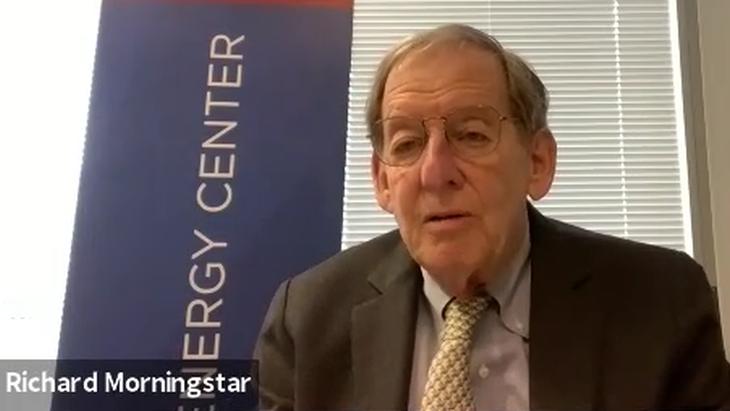HE Richard L. Morningstar, Former US Ambassador to the European Union and Founding Chairman of the Atlantic Council, offered Energynomics a few thoughts in the context of the COP26 conference in Glasgow. He also commented on the current energy prices crisis in Europe.
Thank you very much and it’s very good to be with you! I want to thank Varinia [Radu, CEO and founder of Energynomics] and Energynomics for having me today. I think this is an opportune time for a discussion given the events in Glasgow this week as well as the energy crisis presently in Europe particularly with respect to price.
First, with respect to [the COP26 conference in] Glasgow, let me say that the Biden administration is fully committed. President [Joe] Biden and Secretary [John] Kerry are working every hour at Glasgow to come to a favorable outcome. They are working with different countries to increase their commitments, they’re working to reach agreements for financing particularly with respect to developing countries. I think I should also mention that – maybe this has not got enough attention –president Biden just in the last few weeks has made two very significant achievements, I think. One is that the U.S. and the EU have agreed on the global methane agreement and working to get other countries to sign on to reduce methane, which is such a huge contributor to emissions. The other thing that I think is very important is that president Biden is reducing or modifying the tariffs on aluminum and steel from Europe and allowing a considerable amount of product into the United States. Also, part of the agreement is to work together and to cooperate to decarbonize the steel and aluminum industries. So a lot has been done!
I might also say that the administration has accomplished a lot from a regulatory standpoint to reach climate goals. Ultimately, I think the president will get through his reconciliation package which includes a huge amount going towards dealing with climate change. Congress will pass that I believe in the coming weeks; I know it looks very messy, it is very messy, but I think all of you and Romania know how difficult it can be in dealing with the Parliament! I think that is going to all work out.
Let me say a few words on the energy crisis in Europe. There are a lot of causes for this crisis and we don’t have time in my few minutes to tick off all of them, including weather, droughts in China, huge demand for gas from Asia. But one thing I would like to make clear: I don’t think the energy transition is the cause of this crisis. I don’t think it has in fact contributed in any way to this crisis.
However, there’s certainly a suspicion, particularly among the population, that it does point out that renewables alone on their own is not going to solve the problem. Romania is doing very well with respect to renewables, but gas has to play a major role certainly in the mid-term as part of the solution. Gas has to be part of an ‘all of the above’ approach to the energy transition. We are talking not just about renewables, but also about gas, about new nuclear technologies as well as other new technologies, like hydrogen.
I think that the crisis also emphasizes the need for a just transition relating to climate change. It’s going to cost money, it’s going to affect people’s lives and that all has to be taken into account whether it be in the EU, in the United States or other parts of the world. That has to be recognized to avoid social, cultural, economic, political unrest. It’s going to take money and it’s something that we’re going to have to cooperate on to achieve that just transition.
Let me also mention briefly the role of Russia with respect to the present situation. I want to say right out that Russia is not the cause of the crisis. However, Russia could have been doing a lot more to mitigate the crisis and to alleviate the crisis by shipping more gas to Europe, by filling up reserves and so forth. They’re beginning to do that slightly but they can do a lot more. I think [President Vladimir] Putin has been very clever, he has basically said „Fine, you want more gas, get Nord Stream approved”, using leverage to try to get Nord Stream approved more quickly. He is also saying “You’re willing to rely on a spot market for LNG, well, look what’s happened! What you need is long-term contracts”, meaning long-term contracts with Russia. I think he’s playing it very smart, he has complied with all of their existing agreements but not doing anything to really help the situation. I think that creates a problem for Europe and for the United States. He has complied with all of his agreements, I think it’s going to be difficult for the U.S. and Germany, for example, to agree on new sanctions against Russia because of this, even though I would certainly argue that Russia is using energy as a political weapon. What it means for certain is that we’re all going to have to cooperate to develop alternative energy sources to mitigate any dependence on Russian gas. That includes more gas infrastructure and investment in gas infrastructure including for example the Black Sea project which I think, I hope will go forward. The Three Seas’ initiative is important, and also is important to double down on the green transition, because the more green energy that’s created, the less dependence there’ll be on Russia.
Those are the key points that I would like to make. It’s been a pleasure to be with you and I wish I could be with you in person! I look forward to coming to Bucharest sometime soon. Thank you!
